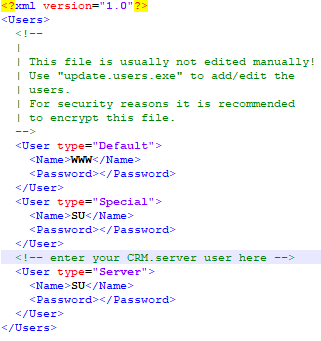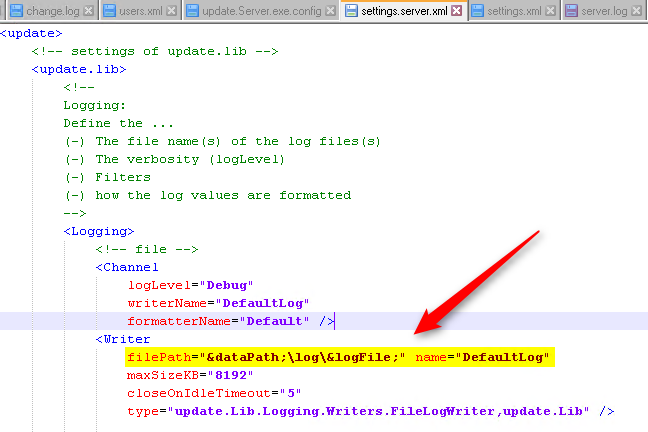Configuring CRM Server to listen to the SyncMiddleWare Message Queues
Learn to set-up CRM Server to listen to the SyncMiddleWare Message Queues.
Before you perform the setup, ensure the following conditions are met:
- ACRM Enterprise version should be 10.2.0 or higher.
- CRM Server should be up and running.
- Ensure that you have all the ACM SyncMiddleware details with you. For more information on ordering the access to the SyncMIddleware, see Ordering Access to the ACM SyncMiddleware.
Perform the following steps:
- Configure the CRM Server user in
user.xmllocated at <CRM.Web Vertical Root>\web\system \settings directory. The CRM Server user should have access to the CRM.server module and the Configuration module. The user should also be defined as CRM.server Rep ID in web configuration to ensure that ToDos are assigned to the user. See the screenshot below, where type=” Server”: Note: It is not mandatory to use SU (super user). Any user having access to CRM.server module account to the Configuration module can be added here. The user should also be defined as a CRM.server Rep ID in CRM.Web configuration.
Note: It is not mandatory to use SU (super user). Any user having access to CRM.server module account to the Configuration module can be added here. The user should also be defined as a CRM.server Rep ID in CRM.Web configuration. - Set the CRM Server users Rep ID in web configuration parameter
UpdateServer.RepID. See the screenshot below:
For more information, see UpdateServer.RepID.
- Update the
<appSettings>element in theupdate.Server.exe.configfile located at<CRM.Web Vertical Root>\web\system\settingsdirectory to point to the correct path of filesettings.server.xml.
- The file
settings.server.xmlshould have the following settings defined.Note: These settings are predefined in a fresh installation of 10.2.20 and higher, but needs to be defined if you are upgrading from versions prior to 10.2.20.- The database connection string should be properly specified.

- The update.server element should include the SyncMiddleware plugin.

- The
<update.PlugIns.Lyris.SyncMiddleware.Consumer>should be defined with the list of consumer queues which are created in ActiveMQ (SyncMiddleware). The name of queues should be unique to every installation. In the following example, the Oraganization UID value is26589cf- ….377pa2.
- Enter the settings for the
<update.configuration>element:
- Set up update.server as a windows service.
- Open a command prompt with administrative privileges and change directory
to
<CRM.Web Vertical Root>\web\bin. - Run the following command:
update.server.exe --install --name "update.server" - The service named update.server should appear in the list of windows services.
- Start the service. If all the settings are configured properly the Status
should change to ‘Running’.

- Open a command prompt with administrative privileges and change directory
to
- To configure the server error log files perform the following steps:
- To troubleshoot errrors in the server setup, set the
loglevelattribute toDebugin the<Logging>element in thesettings.server.xmlfiles. See the screenshot below:
- The following log entry in the log file is a confirmation that the value
set in the web configuration parameter Lyris.SyncMiddleUri is
working.

Note: The URI value is read directly from the Lyris.SyncMiddleUri parameter and if it is changed, restart the Update Server to use the new Sync middleware URI value. - To troubleshoot errrors in the server setup, set the
- The database connection string should be properly specified.